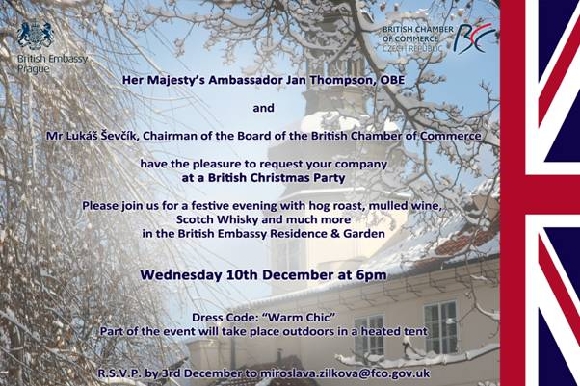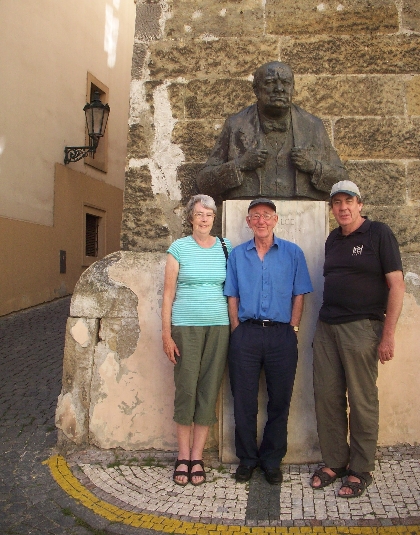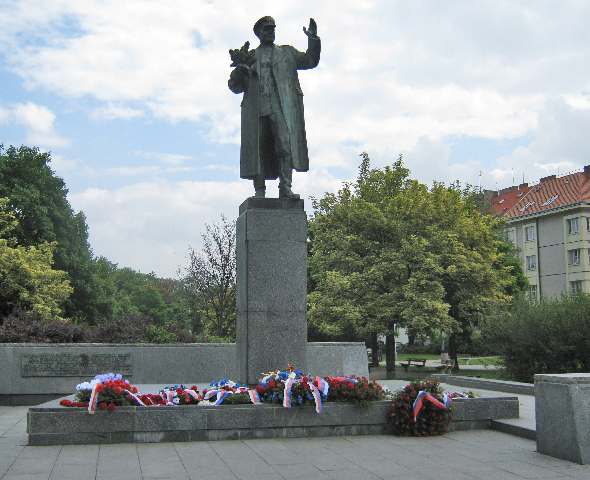
On the evening of Wednesday 10th December, Sybille and I attended the British Ambassador’s Christmas Party held at the Embassy in Mala Strana, one the nice little perks of being the Anglican Chaplain in Prague. Just as we were leaving the main reception room to go downstairs to collect our coats and head home, Sybille stopped to say ‘Hello’ and stroke Maya, one of the Ambassador’s two adopted Czech cats. Maya was occupying a vintage chair by the door, which had a rope stretched across between the two arms, to prevent humans sitting in it. But clearly such regulations do not apply to cats!
Standing nearby were two couples, with one of the couples speaking to each other in German. The German-speaking lady turned to watch Sybille speaking with the cat so I asked her whether she was German, (rather than Austrian or Swiss), and what was she doing in Prague? “My husband is the German Ambassador”, she said. Therefore as Sybille got up from speaking with Maya the cat, I said, “Sybille – meet your Ambassador!” Thus we met the newly arrived German Ambassador to the Czech Republic, Dr. Arndt Freiherr Freytag von Loringhoven, and his wife, Barbara.
This encounter, and the conversation that followed, touched on several issues I’ve written about previously in this blog. It also offered a most interesting insight as to how two Germans, and almost certainly how the government they represent, think about these issues.
Having discovered that Barbara was the wife of the German Ambassador, I duly explained who I was, not least because I was wearing my clerical shirt and collar. Most interestingly, she immediately said that, as a Roman Catholic, she was appalled by the treatment of Jan Hus at the Council of Konstanz . I was pleased that for someone who had only been in the Czech Republic for just under three months, she was very aware that next year would mark the 600th anniversary of the martyrdom of Jan Hus and that major events were planned to mark the anniversary.
Having collected our coats, the four of us walked down through the narrow streets, from the British Embassy, to Malostranské námestí. Here we said, “Auf wiedersehn”, as Sybille and I stepped aboard Tram 12 and the ambassadorial couple continued their walk to the German Embassy and residence, a few streets away.
Earlier this year, I wrote a post entitled ‘Is Prague safe?’. In recent months, that post has become a frequent landing page for new arrivals to my blog, no doubt because it appears on the first page of Google for any enquiry about safety in Prague. If anyone wants further evidence as to how safe Prague is, please note that here was the Ambassador and his wife of a major European country, walking without any associated security entourage, through the streets of Prague, relatively late at night.

At bottom of the short driveway from the gates of the British Embassy to Thunovská, there is this bust of Sir Winston Churchill. My apologies to my sister June and brother-in-law Garry, that this is the only photo I have of the bust, taken with June’s camera by Sybille, during June and Garry’s visit to Prague in August 2012. Upon seeing the bust, probably for the first time ever that evening, Barbara the Ambassador’s wife said to me, “Why would they, (meaning the Czech people), celebrate Churchill. Surely he was responsible at the Yalta Conference in 1945, which divided Europe between East and West”.
After taking a deep breath, I replied by saying, “Because he led the United Kingdom during World War Two and defeated Hitler and his Nazi regime”. I, together with most Czechs, can clearly distinguish between the Third Reich and the current Bundesrepublik Deutschland – a distinction I’m sure the current German Ambassador would also want to make. Please forgive the aside, but I do wish that the British tabloid press could also make that same distinction, whenever England are playing football against Germany 🙁
I could have made the point that the bust was actually erected by the British, though I suspect it needed Czech approval. But the Czechs do admire and respect Churchill. There is a statue of him in námestí Winstona Churchilla (the joys of Czech grammar 🙂 ), in the suburb of Žižkov, on the other side of the Vltava.

But Barbara’s question, does raise the ongoing issue of what achievements of a certain person do you recognise and celebrate, and what other less attractive aspects do you therefore ignore. I have previously written about how the statue of Marshall Ivan Stepanovich Konev of the Soviet Red Army, still remains standing in Námestí Interbrigády, a large square on one side of Jugoslávských partyzánu, the main thoroughfare leading from our nearest Metro station at Dejvická, to Podbaba where we live. It is because he led the troops that liberated Prague from Nazi occupation, finally entering the city early on 9th May 1945, just a few hours after the unconditional surrender of all Nazi troops across Europe, had come into force. One could however, also point out that he also led the Soviet troops who crushed the Hungarian uprising in 1956!
Not everybody agrees with these distinctions, especially with the current actions of the Putin led government of Russia, who most Czechs regard as little different to the communist led Soviet Union which was responsible for the crushing of the 1968 Prague Spring. On the morning of 17th November, ‘Struggle for Freedom and Democracy Day’, which this year marked the 25th anniversary of the beginning of the Velvet Revolution that toppled the Soviet supported communist regime in Czechoslovakia, someone sprayed the statue of Marshall Konev with pink paint 😉 Unfortunately, before I could get a photo, the local authority got the paint removed.
This then brings me to the final point about our most enjoyable encounter and conversation that night. The next day, Sybille and I duly researched a little more about the new German Ambassador. He comes from German nobility – the name being a giveaway 🙂 He has also done two stints in Moscow which both he and his wife told us in conversation. But most interestingly, Sybille discovered through reading the German Wikipedia article about him, that between 2007-2010, he was Vice President of the Bundesnachrichtendienst, the German Federal Intelligence Service.
Both of us feel that with all this experience, the appointment of Dr. Arndt Freiherr Freytag von Loringhoven as German Ambassador to the Czech Republic, reflects the concern of the current German government about the intentions of Putin led Russia, towards the former Warsaw pact states of Central and Eastern Europe. I outlined these concerns in my post entitled, ‘The Ukraine crisis as seen from the Czech Republic’. Sadly, nine months on, those concerns remain and have become ever stronger.

